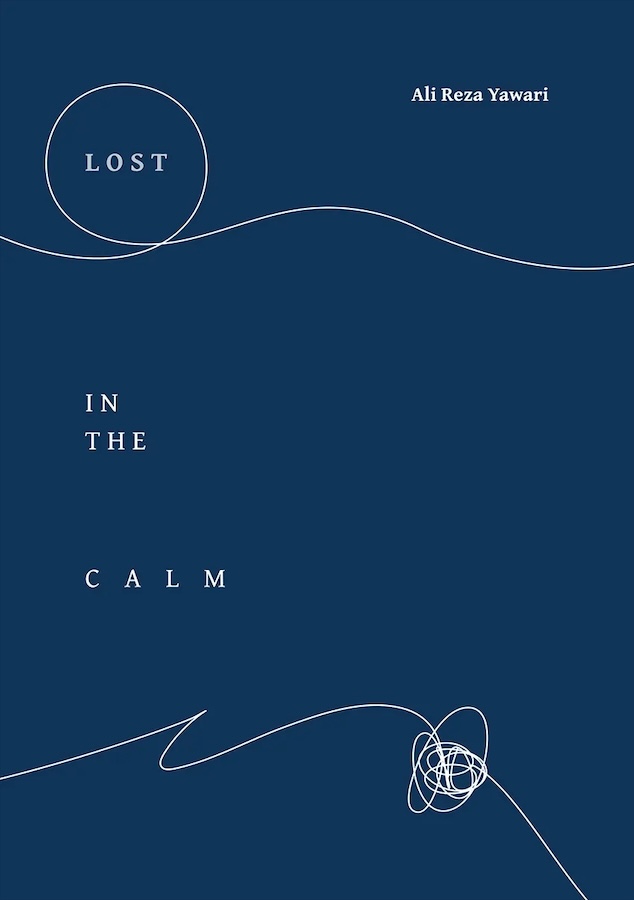Imagine doing nothing, and nothing for a decade / Not because you don't want to / But because you are not permitted to / The Courage is gone and never coming back / Imagine!!! / No you cannot. You cannot imagine. / Actually, no one can.
- Ali Reza Yawari, Lost in the Calm
Ali Reza Yawari doesn’t need to imagine.
Outwardly he looks fit and well, seemingly unbruised by years of fear, humiliation, being discarded. He is growing too fast and alone in an alien land. That smooth appearance masks the emptiness; for Ali, 26, has had more harrowing experiences than ‘you cannot imagine’. In his book, Lost in the Calm, part autobiography-part poetry collection, he’s using these experiences to help others.
Ali is Hazara, a persecuted minority in his homeland Afghanistan. As a teenager he was sent to an Indonesian adult prison in breach of international law and civil code. He talks little of that time apart from saying he learned self-protection and distrust; it’s clear he is scarred.
Ali’s father paid (fee unknown) a people smuggler to get his son to safety; the destination, Australia. First there was a flight to India, then on to Malaysia, and finally a journey across the Malacca Strait to Sumatra on an overcrowded prau lashed by a storm.
I could see myself drown in a second… I could hear the woman next to me whispering out loud the prayer for God to save her and her child. I realised how death is real.
In Jakarta he gave himself up for the food and shelter that comes with prison. It was November 2014, he was just 15 years old and had made a terrible mistake. Ali was simply too late. A few months earlier, the then Australian Immigration Minister Scott Morrison celebrated that any new chancers 'would never set foot in Australia'.
The worst was waiting for assistance after he found his roommate had tried to hang himself. The man had discovered the bulging suitcase labelled HOPE he'd dragged from Afghanistan was empty.
You may get tired of searching / But the one who is lost will not get tired of waiting.
Back in Afghanistan Ali had learnt some English,
I continued self-learning when in detention and started to teach others from basics which helped me focus … I usually read non-fiction and real stories and journals. I loved watching and listening to talk shows and interviews with prominent people. Kite-Runner by Khaled Hosseini was my home-seeking read by which I kept inspired.
It has been eleven years. Violent offenders get less. Ali and his fellow asylum seekers stuck in Indonesia plead for resettlement but are told to go elsewhere. For the Hazara that place doesn’t exist.
I am lost in the way… In the maze of a crowd screaming in silence.
An overwhelming irony
In his biography/poetry collection - in the genre of experience versus policy - Ali reveals our moral flaws. Fortunately for his readers he has found some peace in Bandung but it is not easy: 'I have issues with trusting people. That is why I only develop friendships with whom I feel safe and close'. He explains that some of his fellow asylum seekers see his activism as provocative, 'like my documentary films, book writing, and other creative means of using my talents/skills to awareness-raising, advocacy, and the right to liberty and freedom of speech'.
There's a ripple of concern in Australia for the 12,000 or so asylum seekers stuck in Indonesia. Australian 'helpers' are often uncoordinated, floundering in swamps of stagnating bureaucracy. Some visit on tourist visas to bring cheer and money. Others lobby faith groups, sporting clubs, mates, politicians. They fear the political right will shriek that compassion will open the floodgates. More recently there are less people smugglers, but a few still test the waters. Why hasn't Ali tied a rope around a bathroom clothes hook? Around 20 have reportedly died so far. Instead, he has found ways into the sunshine as a volunteer teacher, through Taekwondo, a sport he knew in Afghanistan, and his writing.
Ali speaks at meetings of human rights activists and makes short videos. He was involved in an art exhibition 'Let’s walk my journey' sponsored by the Indonesian Resilience Development Initiative Urban Refugee Research Group. He helps as a counsellor with the Asia Pacific Refugee Rights Network.
You may get tired of searching / But the one who is lost will not get tired of waiting.
The Hazara are Shia Muslims, a minority sect persecuted in Afghanistan and Indonesia. Ali’s writing is secular and frank, enlarging his appeal. No magic herbs or ancestral wisdom. Just grit from the dry creek of experience.
Reality may slap so hard and unexpectedly, but let's not deny it; this is the reality. Life gets realistic when you stay and fight back with a purpose.
These notes help me to remember what I have been going through, how I survived and what things have helped me thrive. The past is part of my existence … upholding my determination to become nothing but a good man.
Sharing can help others survive. Through pain comes insights.
Duncan Graham (wordstars@hotmail.com) is an Australian journalist living in East Java. For copies of Lost in the Calm contact buku.yawari@gmail.com.













